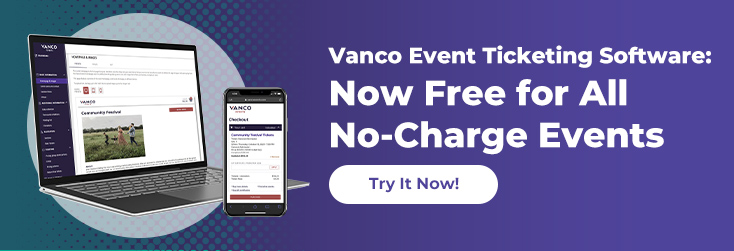Organizing a church event is a great way to help current members connect outside services and to welcome new members, and for a church event planner, there are a few key points to consider when choosing what type of event to offer. You want to find an event that will generate interest, engage attendees and deliver memories and a faith-centered message. While that may seem like a challenge, planning great events is easier than you might think. Below, you’ll find helpful hints and ideas, walking you through every stage of what it takes to be a church event planner for ladies church groups or women's ministry events, youth groups and more. We’ll even provide a free church event planning template to help you along the way, so let’s get started.
Table of Contents
- Choosing the Right Church Event Planner
- Church Event Planning Guidelines
- Selecting the Best Volunteers
- Choosing the Day of the Church Event
- Deciding What Happens After the Event?
- When to Start Planning for the Next Installment?
- Free Church Event Planning Template
- Get the Free Ultimate Church Event Kit
How Do You Organize a Church Event?
All churches, big and small, host events throughout the year. These events include Easter programs, church picnics, fundraising events, revivals and watch night services.
Planning church events isn't a small task. You need people who are skilled in many areas. If you're wondering how do you organize a church event, there are several steps to take in the beginning stages.
First, you need to determine what type of event you want to host and who's your target audience. Next, you need to come up with a budget for the event. Third, get approval from the church administration to host the event. Fourth, consider who will be the church event planner.
Creating a proposal to present to church leadership is a good idea. Church events must have a purpose, and the pastor will want to know how it will impact the church, the members, and the intended audience. A proposal will help you think through everything and prepare answers to questions you'll get from leadership.
1. Choosing the Right Church Event Planner
 Choosing the right church event planner is a crucial aspect of hosting a successful event. Sometimes the church loves the event idea but believes it needs someone with more expertise to lead the project. If you choose an event planner, the person whose idea it was can still play a pivotal role.
Choosing the right church event planner is a crucial aspect of hosting a successful event. Sometimes the church loves the event idea but believes it needs someone with more expertise to lead the project. If you choose an event planner, the person whose idea it was can still play a pivotal role.
More than likely, your event planner will be a volunteer unless you have a large church with a paid event planner on your team. Just because someone successfully planned the church picnic doesn't mean they can plan a church conference or holiday gala.
Basic traits event planners should possess include the following:
- exceptional organization skills
- great communicators
- leadership skills
- problem solvers
- works well with diverse groups
In addition to these traits, you want someone experienced with team building. They should also have a good understanding of technology and event-planning tools. Also important is working with a budget.
The church can advertise its need for an event planner and specify certain skills they need as if they were looking for a staff member.
2. Church Event Planning Guidelines
 Churches hosting various activities throughout the year should create church event planning guidelines. Having guidelines in place will help event planning operate under set standards. Here are a few things to include.
Churches hosting various activities throughout the year should create church event planning guidelines. Having guidelines in place will help event planning operate under set standards. Here are a few things to include.
Submitting Church Event Ideas
Create a document church leadership, ministry leaders, and members can complete when submitting church event ideas. The form will include who, what, when, where, why, and the cost.
Church Event Committee
Have an event committee of three or more people to review submissions. If an event passes this process phase, the committee will submit the idea to the church's leadership. Leadership will approve, deny, or request more information.
Create a Budget
It's essential to have protocols in place regarding event planning. Many churches require ministries to include events in their annual budget requests. However, this should not preclude someone from submitting an idea during the year.
Once an event is approved, a budget is created. It's a good idea for churches to have an annual event budget. This concept helps curtail costs and limits the number of mid-year events that will receive approval.
The budget should include the following cost allocations:
- decorations
- food
- marketing strategies
- room and equipment rentals
- speaker fees (hotel, travel, meals)
Event Fees
Will attendees incur fees for participating in the event? Today's churches are big on conferences and concerts. These types of events could include an entrance fee. You'll need to determine the cost and methods of payment.
3. Selecting the Best Volunteers
 Once the church event planner is selected, they will need to advertise for church volunteers. Before doing so, you must understand the roles you'll need on the team—for example, communications, recording secretary, and marketing.
Once the church event planner is selected, they will need to advertise for church volunteers. Before doing so, you must understand the roles you'll need on the team—for example, communications, recording secretary, and marketing.
If you want the event to go off without a hitch, make sure your team consists of volunteers committed to the event's success.
Utilizing the church's newsletters, social media, and online member portals to solicit volunteers. Churches with large media ministries are a great asset. They can run digital advertisements during services, and you place the church planner on the program to address the church membership during Sunday service.
4. Choosing the Day of the Church Event
 The church event planning guidelines don't stop at the organizing phase. Your event guidelines address every step of the process, including the day of the event.
The church event planning guidelines don't stop at the organizing phase. Your event guidelines address every step of the process, including the day of the event.
The guidelines include what time volunteers need to arrive. Make sure it's clear what duties each person is assigned and who to contact if an issue arises.
Schedule your teams to arrive well before the event's starting time. Determine if volunteers must be there the entire time or if they will work in shifts. It is a good idea for shifts to overlap to ensure full coverage at all times.
5. Deciding What Happens After the Event?

Church event planning guidelines move into post-event mode. Every event needs a process to determine if the event meets the church's expectations. This portion of the church event planner's duties is used to assess and evaluate the event's success.
Another good idea is to offer attendees a post event survey. You can pass out the survey at the end of the event or send out a survey via email. Use the information to determine if the event should become a part of the church's annual calendar.
The most important question is how many lives were changed and how many new people it brought to Christ. Last, share memories and important moments from the event.
6. When to Start Planning for the Next Installment?

Sometimes a church event is so phenomenal that you want to do it again.
Everyone loved the events, people's lives were changed, and an x-number of people joined the church. The final church event planner tips are geared toward deciding the next steps.
Post-planning meetings are when you inspect what you expect from the event's outcome. Did you stay within the budget, what would you change, and what should you keep? The goal is always to improve on the previous event.
7. Use a Free Church Event Planning Template

Being a church event planner isn’t easy. That’s why we built a free church event planning form to help you get started. This free checklist runs through all the necessary components of event planning that you'll need to tackle. Read through the church event planning worksheet carefully and complete the open fields to ensure you have everything covered. Then, you'll be ready to plan an event that will energize existing members and grow your church membership by adding new faces to your congregation. You can even promote these great events through cost-effective means. Using a free church announcement guide with well-crafted templates and other resources is also helpful.
Church Event Planning Form
Basic Information
Name of Event: __________
Date of Event: __________
Time of Event: __________
Setup Requirements for Church Staff: __________
(Setup requirements for church staff include needs like unlocking buildings, providing/setting up chairs or tables, providing a cooler, etc. and need to be defined in detail in the provided area of the church event planning template)
Event Location: __________
Event Coordinator/Contact Person: __________
Event Message: __________
(What is the message you hope to portray to the audience at this event? Or, what would you like the audience to know or do? Please define in detail.)
Budgeting
Event Budget: __________
--Vendor Costs: __________
--Have checks been submitted and approved for these costs? _Y _N
Invitations
Was the mailing list generated? _Y _N
Were the invitations composed? _Y _N
Were names and mailing addresses checked for accuracy? _Y _N
Were invitations sent out? _Y _N
Have RSVPs been received? _Y _N
Catering
Total cost per head or upfront costs: __________
Has the culinary team confirmed availability? _Y _N
Beverage options: __________
Food options: __________
Are food options hot or cold? _ HOT _COLD
Is catering being done internally or externally? _ INTERNALLY _ EXTERNALLY
Will food be self-service, or will there be wait staff? _ SELF _ STAFF
Have you sourced tables, tablecloths, cups, and saucers for the event? _Y _N
Have you sourced plates, napkins, knives, forks, and spoons for the event? _Y _N
Can the theme of the event be followed through in catering? _Y _N
If yes, please provide more details: __________
Are there any special dietary requirements among the guests? _Y _N
If yes, please provide more details: __________
Has the menu been completed? _Y _N
Advertising
What personal advertising methods have been/will be used for this event? __________
(Examples of personal advertising methods include individual invitations, emails and word-of-mouth)
What wide-reaching advertising methods have been/will be used for this event? _________
(Examples of wide-reaching advertising methods include radio, TV, newsletters, social media, etc.)
Is this an invitation-only event that didn't require advertising? _Y _N
If yes, please explain why this is an invitation-only event: __________
Event Schedule/Program
Has the event schedule/program been finalized? _Y _N
Has the event schedule/program been approved (as applicable)? _Y _N
Was the running sheet written? _Y _N
Did event speakers confirm their appearance/attendance? _Y _N
Was the running sheet sent to any event speakers? _Y _N
Were the event speakers fully briefed? _Y _N
Was the running sheet sent to the caterers? _Y _N
Added Value Options for Guests
Please place a checkmark next to the items on the church event planning worksheet that will be provided for additional value to the guests, whether they be available for free or at additional cost.
__ Copy of publication
__ Gifts (funded by event coordinator)
__ Gifts (funded by patrons - i.e. for a white elephant sale or charity auction)
__ Printed programs
__ Catalogs
__ Special offers or discounts for attendance
__ Competitions
__ Prizes
Additional Planning
Was security alerted and briefed? _Y _N
Has a first aid station or personnel been procured? _Y _N
Are all staff booked? _Y _N
Have floral arrangements and other decorations been secured? _Y _N
Has a DJ or background music been planned? _Y _N
Is there wheelchair access? _Y _N
Has housekeeping been secured for before, after, and during the event? _Y _N
Has welcome signage been planned for the front entrance? _Y _N
8. Use Event Ticketing Software Built for Churches
Event ticketing software, like Vanco Events, can greatly simplify the process of managing and organizing events. Here are some key benefits of using such software:
- Seamless ticket sales and registration: With event ticketing software, churches can easily sell tickets and manage registrations online. Attendees can conveniently purchase tickets from the comfort of their homes, increasing accessibility and reaching a broader audience.
- Integrated payment processing: Vanco Events has built-in payment processing capabilities, allowing churches to securely collect ticket fees and donations online. This eliminates the need for manual payment handling and reduces administrative tasks.
- Customizable event pages: Churches can create branded event pages that reflect their unique identity and style. These pages can include event details, photos, videos and any other relevant information to engage and inform attendees.
- Real-time attendance tracking: Event ticketing software provides real-time data on ticket sales and attendee numbers, allowing organizers to track event attendance and make informed decisions regarding logistics, capacity and resources.
- Reporting and analytics: Comprehensive reporting and analytics features enable churches to gain insights into event performance, attendee demographics, ticket sales and revenue. This information can inform future event planning and help optimize strategies for better outcomes.
By utilizing event ticketing software built specifically for churches, event organizers can streamline the ticketing and registration process, enhance attendee experience, and efficiently manage events from start to finish.
Prior to events, be sure to send out a church event invitation letter to let people know the details. If it's an event for kids, send out a church event permission letter as well.
Then once your event takes place, be sure to send a thank you for attending our church event message to attendees so they feel wanted and welcomed. This makes people more likely to come back for future events.
Looking for More Helpful Tools for Church Events?
Running a church event is stressful for you and your volunteers. Get some help with our free Ultimate Church Event Kit. Download it now to access...
- Permission slip
- Event planning checklist
- Church event letter templates
FAQs
How far in advance should you plan a church event?
A church event planner should consider advanced strategic planning and refer to a church planning calendar. The timeline for planning a church event can vary depending on its size and complexity. However, it is generally recommended to start the planning process at least 3-6 months in advance. This allows sufficient time to secure a venue, coordinate with speakers or performers, develop a marketing strategy, and handle logistics such as obtaining permits or licenses if needed. By starting early, you'll have ample time to address any challenges that may arise and ensure a smooth execution of the event.
What are the key components of a successful church event?
When it comes to church event planning, having a comprehensive weekly planner is essential. Planning Center offers a powerful solution for scheduling volunteers, managing fasting periods, and providing space for goal setting. With its calendar featuring feasts and liturgical observances, you can easily incorporate religious traditions into your event planning.
The Planning Center calendar allows you to navigate monthly and weekly calendars, ensuring that you have a clear overview of all scheduled events. This feature comes in handy when dealing with potential scheduling conflicts, as it helps you manage and allocate resources effectively.
Additionally, a weekly planner provides daily feasts and the ability to create monthly dashboards, giving you a convenient way to track progress and stay organized.
Several key components contribute to the success of a church event:
- Clear objectives: Clearly define the purpose and goals of the event. Whether it is to promote community engagement, raise funds for a specific cause, or provide educational opportunities, having a clear focus will help guide the planning process.
- Effective planning: Thoroughly plan the event, considering all logistical aspects such as venue selection, budgeting, scheduling, volunteer coordination, and marketing strategies. Attention to detail during the planning stage ensures a well-executed event.
- Engaging content: Develop engaging content that aligns with the event's purpose. This may include inspiring speeches, uplifting music performances, interactive workshops, or relevant presentations. The content should resonate with the target audience and create a meaningful experience.
- Promotion and marketing: Utilize various marketing channels such as social media, email newsletters, digital church bulletins, and word-of-mouth to promote the event. Effective marketing efforts increase awareness and attract attendees.
- Volunteer involvement: Engage volunteers within the church community to support various aspects of the event, including setup, registration, hospitality, and cleanup. Volunteers bring energy, enthusiasm, and a sense of community to the event.
- Evaluation and feedback: After the event, evaluate its success by collecting feedback from attendees, volunteers, and stakeholders. Analyze the event's impact, attendee satisfaction, and areas for improvement. This feedback will inform future event planning efforts.
How can technology aid in church event planning?
Technology can greatly aid in church event planning in several ways:
- Event management software: Utilize event management platforms that provide features such as online registration, ticketing, attendee tracking and automated communication. These tools streamline administrative tasks and enhance the overall planning process and can be a major boost to your fundraising strategy.
- Online collaboration tools: Use online collaboration tools like project management software or shared document platforms to facilitate communication and coordination among event planning teams. These tools allow for real-time collaboration and easy sharing of information.
- Social media and digital marketing: Leverage social media platforms to promote church events, reach a wider audience and engage with potential attendees. Paid digital advertising can also be effective in targeting specific demographics and maximizing event visibility.
- Livestreaming and virtual options: In situations where physical gatherings are not possible or limited, technology enables live streaming or virtual event options. These platforms allow attendees to participate remotely and ensure inclusivity.
- Data analytics: Utilize data analytics tools to gather insights on attendee behavior, preferences, and engagement. This information helps optimize marketing strategies, improve event experiences and make data-driven decisions for future events.
How do you evaluate the success of a church event?
To evaluate the success of a church event, consider the following factors:
- Attendance: Assess the number of attendees and compare it to your target or expected turnout. Higher attendance indicates a greater level of interest and engagement.
- Feedback and surveys: Collect feedback from attendees regarding their experience, satisfaction levels, and suggestions for improvement. This feedback can be gathered through online surveys, comment cards or post-event evaluations.
- Goal achievement: Evaluate whether the event achieved its intended goals and objectives. Did it raise funds, create community awareness, provide educational value or strengthen relationships? Assess the event's impact based on these goals.
- Volunteer engagement: Gauge the level of volunteer involvement and their satisfaction with their roles. Strong volunteer engagement indicates a successful event and a sense of community within the church.
- Financial performance: Analyze the financial aspects of the event, including revenue generated, expenses incurred and overall profitability. Evaluate whether the event met financial targets or contributed positively to the church's financial goals.
- Follow-up actions: Assess whether the event led to further engagement or follow-up actions. For example, did attendees sign up for future programs, join small groups or make ongoing contributions to the church community?
By considering these factors, you can gain a comprehensive understanding of the event's success and areas for improvement, enabling you to refine your future event planning strategies.
Are there specific legal considerations for church events?
Yes, there are specific legal considerations that churches should keep in mind when planning events. Here are a few key factors to consider:
- Permits and licenses: Depending on the nature of the event and the location, you may need to obtain permits or licenses from local authorities. This could include permits for using public spaces, serving food or playing copyrighted music.
- Insurance coverage: It is important to ensure that your church has appropriate insurance coverage for events. This can protect against liabilities, accidents, property damage and other unforeseen circumstances that may occur during the event.
- Safety and security: Churches should prioritize the safety and security of attendees. This includes ensuring proper crowd management, emergency preparedness and adherence to fire and building codes.
- Child protection policies: If your event involves activities or programs for children, it is crucial to have child protection policies in place. This includes background checks for volunteers, protocols for supervision and guidelines for ensuring the safety of children.
- Compliance with accessibility regulations: Ensure that your event venue is accessible to individuals with disabilities, complying with accessibility regulations such as wheelchair ramps, accessible restrooms and appropriate signage.
- Privacy and data protection: If you collect personal information from attendees during the event registration process, ensure that you have appropriate data protection procedures in place and comply with relevant privacy laws.
It is recommended to consult with legal professionals or advisors who specialize in event management and church law to ensure compliance with all applicable laws and regulations.











